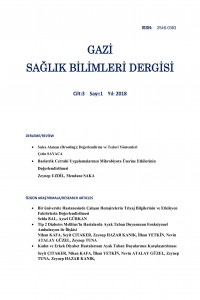Öz
Obezitenin
tedavisine ve bazı kronik hastalıkların önlenmesine yardımcı olan bariatrik
cerrahi uygulaması vücutta çeşitli fizyolojik etkilere neden olmaktadır.
Bunlardan birisi mikrobiyota olarak adlandırılan bağırsak florasının içeriğinin
değişmesidir. Cerrahi sonrası mikrobiyotanın değerlendirildiği insan ve rat
çalışmalarında mikrobiyotanın önemli filumu olan Firmicutes ve
Bacteroidetes bakterilerinde bu değişiminin daha çok görüldüğü
bilinmektedir. Bağırsakta daha çok kısa zincirli yağ asidi üretimine ve
emilimine neden olan Firmicutes filumunda cerrahi sonrası azalma
olmaktadır. Cerrahi sonrasında safraya dirençli olan Proteobacteria filumundaki bakterilerde
artış olduğu bilinmektedir. Cerrahiye bağlı metabolik değişikliklerin
mikrobiyal içeriği etkilediği belirtilmektedir.
Anahtar Kelimeler
Kaynakça
- Barlow GM, Yu A, Mathur R. Role of the gut microbiome in obesity and diabetes mellitus. Nutr Clin Pract. 2015;30:787-97. 2. Bays HE, Jones PH, Jacobson TA, Cohen DE, Orringer CE, Kothari S. et al. Lipids and bariatric procedures part 1 of 2: Scientific statement from the National Lipid Association, American Society for Metabolic and Bariatric Surgery, and Obesity Medicine Association: Full Report. Journal of Clinical Lipidology. 2016;10:33–57. 3. Dibaise JK, Zhang H, Crowell MD, Krajmalnik-Brown R, Decker GA, Rittmann BE. Gut microbiota and its possible relationship with obesity. Mayo Clin Proc. 2008;83(4):460-9. 4. Zhang H, Dibaise JK, Zuccolo A, Kudrna D, Braidotti M, Yu Y. et al. Human gut microbiota in obesity and after gastric bypass. PNAS. 2009;106(7):2365-70. 5. Das UN. Obesity: Genes, brain, gut, and environment. Nutrition. 2010;26:459–73. 6. Sweeney TE, Morton JM. The human gut microbiome: a review of the effect of obesity and surgically ınduced weight loss. JAMA Surg. 2013;148(6): 563–9. 7. Samuel BE, Gordon JL. A humanized gnotobiotic mouse model of host–archaeal– bacterial mutualism. PNAS. 2006;103:10011-10016. 8. Li JV, Ashrafian H, Bueter M, Kinross J, Sands C, W le Roux C. et al. Metabolic surgery profoundly influences gut microbial-host metabolic crosstalk. Gut. 2011;60(9):1214–23. 9. Furet JP, Kong LC, Tap J, Poitou C, Basdevant A, Bouillot JL. et al. Differential adaptation of human gut microbiota to bariatric surgery–induced weight loss links with metabolic and low-grade inflammation markers. Diabetes. 2010;59:3049–57. 10. Ryan KK, Tremaroli V, Clemmensen C, Kovatcheva-Datchary P, Myronovych A, Karns R. et al. FXR is a molecular target for the effects of vertical sleeve gastrectomy. Nature. 2014;509(7499):183-8. 11. Turnbaugh PJ, Hamady M, Yatsunenko T, Cantarel BL, Duncan A, Ley RE. et al. A core gut microbiome in obese and lean twins. Nature. 2009;457(7228):480–4. 12. Duncan SH, Lobley GE, Holtrop G, Ince J, Johnstone AM, Louis P. et al. Human colonic microbiota associated with diet, obesity and weight loss. International Journal of Obesity. 2008;32:1720–4. 13. Nadal I, Santacruz A, Marcos A, Warnberg J, Garagorri M, Moreno LA. et al. Shifts in clostridia, bacteroides and immunoglobulin-coating fecal bacteria associated with weight loss in obese adolescents. International Journal of Obesity. 2009;33:758–67.
- 14. Turnbaugh PJ, Ley RE, Mahowald MA, Magrini V, Mardis ER, Gordon JI. An obesity-associated gut microbiome with increased capacity for energy harvest. Nature. 2006;444:1027-31. 15. Basseri RJ, Basseri B, Pimentel M, Chong K, Youdim A, Low K. et al. Intestinal methane production in obese individuals is associated with a higher body mass index. Gastroenterology & Hepatology. 2012;8(1):22-8. 16. Mathur R, Amichai M, Chua KS, Mirocha J, Barlow GM, Pimentel M. Methane and hydrogen positivity on breath test is associated with greater body mass index and body fat. J Clin Endocrinol Metab. 2013;98:698–702. 17. Mathur R, Kim G, Morales W, Sung J, Rooks E, Pokkunuri V. et al. Intestinal methanobrevibacter smithii but not total bacteria is related to diet-induced weight gain in rats. Obesity. 2013;21(4):748-54. 18. Osto M, Abegg K, Bueter M, Roux CW, Cani PD, Lutz TA. Roux-en-Y gastric bypass surgery in rats alters gut microbiota profile along the intestine. Physiology & Behavior. 2013;119:92-6. 19. Liou AP, Paziuk M, Luevano JM, Machineni S, Turnbaugh PJ, Kaplan LM. Conserved shifts in the gut microbiota due to gastric bypass reduce host weight and adiposity. Sci Transl Med. 2013;5(178):1-11. 20. Tremaroli V, Karlsson F, Werling M, Stahlman M, Kovatcheva-Datchary P, Olbers T. et al. Roux-en-Y gastric bypass and vertical banded gastroplasty induce long-term changes on the human gut microbiome contributing to fat mass regulation. Cell Metabolism. 2015;22:228–38. 21. Li JV, Reshat R, Wu Q, Ashrafian H, Bueter M, W. le Roux C. et al. Experimental bariatric surgery in rats generates a cytotoxic chemical environment in the gut contents. Frontiers in Microbiology. 2011;2:1-9. 22. Graessler J, Qin Y, Zhong H, Zhang J, Licinio J, Wong ML. et al. Metagenomic sequencing of the human gut microbiome before and after bariatric surgery in obese patients with type 2 diabetes:correlation with inflammatory and metabolic parameters. The Pharmacogenomics Journal. 2013;13:514–22. 23. Damms-Machado A, Mitra S, Schollenberger AE, Kramer KM, Meile T, Königsrainer A. et al. Effects of surgical and dietary weight loss therapy for obesity on gut microbiota composition and nutrient absorption. BioMed Research International. Volume 2015;1-12. 24. Kong LC, Tap J, Aron-Wisnewsky J, Pelloux V, Basdevant A, Bouillot JL. et al. Gut microbiota after gastric bypass in human obesity: increased richness and associations of bacterial genera with adipose tissue genes. Am J Clin Nutr. 2013;98:16–24. 25. Mathur R, Mundi MS, Chua KS, Lorentz PA, Barlow GM, Lin E. et al. Intestinal methane production is associated with decreased weight loss following bariatric surgery. Obesity Research & Clinical Practice. 2016;10:728-33. 26. Woodard GA, Encarnacion B, Downey JR, Peraza J, Chong K, Hernandez-Boussard T. et al. Probiotics improve outcomes after roux-en-y gastric bypass surgery: a prospective randomized trial. J Gastrointest Surg. 2009;13:1198–1204.
Ayrıntılar
| Birincil Dil | Türkçe |
|---|---|
| Bölüm | Makaleler |
| Yazarlar | |
| Yayımlanma Tarihi | 30 Mart 2018 |
| Gönderilme Tarihi | 17 Kasım 2017 |
| Kabul Tarihi | 26 Mart 2018 |
| Yayımlandığı Sayı | Yıl 2018 Cilt: 3 Sayı: 1 |


